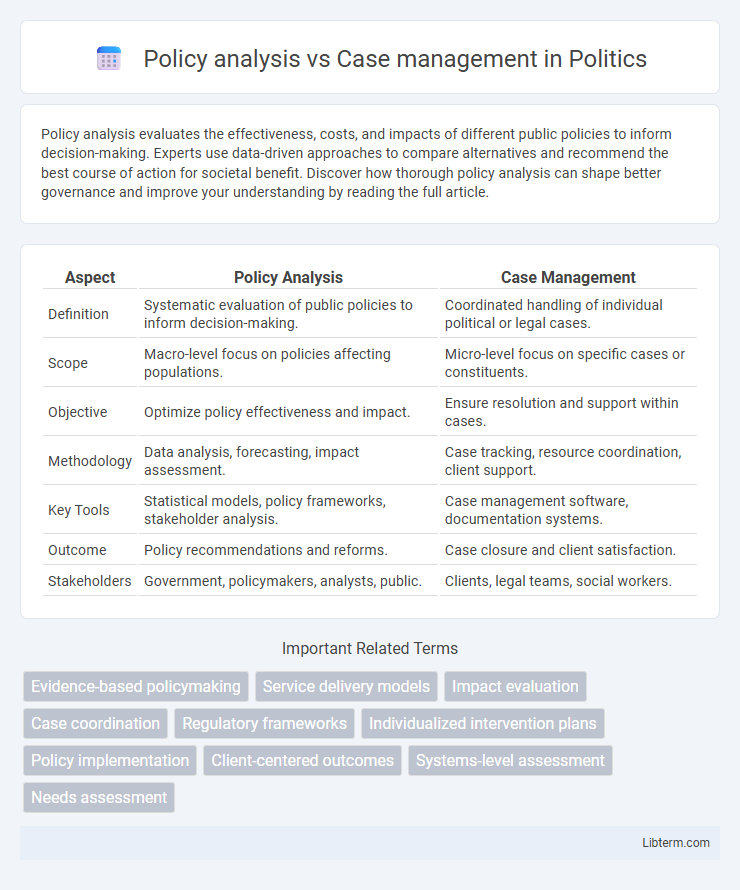Policy analysis evaluates the effectiveness, costs, and impacts of different public policies to inform decision-making. Experts use data-driven approaches to compare alternatives and recommend the best course of action for societal benefit. Discover how thorough policy analysis can shape better governance and improve your understanding by reading the full article.
Table of Comparison
| Aspect | Policy Analysis | Case Management |
|---|---|---|
| Definition | Systematic evaluation of public policies to inform decision-making. | Coordinated handling of individual political or legal cases. |
| Scope | Macro-level focus on policies affecting populations. | Micro-level focus on specific cases or constituents. |
| Objective | Optimize policy effectiveness and impact. | Ensure resolution and support within cases. |
| Methodology | Data analysis, forecasting, impact assessment. | Case tracking, resource coordination, client support. |
| Key Tools | Statistical models, policy frameworks, stakeholder analysis. | Case management software, documentation systems. |
| Outcome | Policy recommendations and reforms. | Case closure and client satisfaction. |
| Stakeholders | Government, policymakers, analysts, public. | Clients, legal teams, social workers. |
Introduction to Policy Analysis and Case Management
Policy analysis involves systematically evaluating public policies to determine their effectiveness, cost-efficiency, and social impact, using qualitative and quantitative data to support decision-making. Case management is a collaborative process focused on assessing, planning, and coordinating services to meet individual client needs, particularly in healthcare and social work settings. Understanding the distinctions between policy analysis and case management is essential for professionals aiming to influence systemic change or provide targeted client support.
Defining Policy Analysis: Scope and Objectives
Policy analysis involves systematically evaluating public policies to determine their effectiveness, efficiency, and equity in addressing societal issues. The scope includes assessing policy options, forecasting outcomes, and providing evidence-based recommendations to inform decision-making processes. Its primary objective is to guide policymakers in designing, implementing, and refining policies that achieve desired social, economic, or environmental goals.
Understanding Case Management: Key Functions
Case management involves coordinating comprehensive services to meet clients' specific needs while ensuring efficient resource utilization and continuous support. Key functions include assessment, planning, implementation, monitoring, and evaluation of individualized care plans to achieve optimal outcomes. This process requires collaboration among multidisciplinary teams to address social, medical, and psychological aspects effectively.
Differences in Purpose and Approach
Policy analysis primarily focuses on evaluating and developing strategies to address broad public issues through systematic assessment of data, costs, benefits, and potential impacts. Case management centers on providing personalized coordination and support services to individuals, ensuring their specific needs and goals are met within systems like healthcare or social services. While policy analysis uses a macro-level, analytical approach for decision-making, case management employs a micro-level, hands-on approach aimed at practical implementation and client advocacy.
Skills Required for Policy Analysts vs Case Managers
Policy analysts require strong analytical skills, proficiency in data interpretation, and expertise in research methodologies to evaluate and develop public policies effectively. Case managers need excellent interpersonal communication, problem-solving abilities, and organizational skills to coordinate services and support clients efficiently. Both roles demand critical thinking, but policy analysts focus more on data-driven decision-making while case managers emphasize client-centered service delivery.
Tools and Methodologies Employed
Policy analysis employs quantitative tools such as cost-benefit analysis, statistical modeling, and scenario planning to evaluate the potential impacts and effectiveness of policy options. Case management utilizes client-centered methodologies, including needs assessment, care coordination software, and progress tracking systems to tailor interventions and monitor outcomes. Both fields integrate data-driven decision-making, but policy analysis focuses on macro-level systemic evaluation while case management emphasizes micro-level personalized care processes.
Impact on Decision-Making and Outcomes
Policy analysis provides a data-driven evaluation of potential strategies, enhancing decision-making by offering evidence-based insights that guide resource allocation and program development. Case management focuses on individualized client needs, improving outcomes through tailored interventions and continuous monitoring that adapt to changing circumstances. Combining both approaches creates a comprehensive framework that balances systemic policy considerations with personalized support, leading to more effective and sustainable results.
Real-World Applications in Social Services
Policy analysis in social services involves evaluating programs and regulations to inform decision-making and improve resource allocation, directly impacting systemic change. Case management focuses on individualized support, coordinating care and services for clients to address specific needs and promote well-being. Real-world applications highlight policy analysis shaping broad service frameworks, while case management ensures effective implementation through personalized intervention.
Challenges and Ethical Considerations
Policy analysis faces challenges such as balancing stakeholder interests, ensuring data accuracy, and anticipating long-term societal impacts while maintaining transparency and avoiding bias. Case management struggles with confidentiality, informed consent, and equitable resource allocation, requiring practitioners to uphold ethical standards in client advocacy and privacy protection. Both fields demand rigorous ethical frameworks to address dilemmas like conflict of interest and fairness in decision-making processes.
Future Trends in Policy Analysis and Case Management
Emerging technologies such as artificial intelligence and big data analytics are transforming policy analysis by enabling more precise predictive modeling and evidence-based decision-making. In case management, digital platforms and telehealth services are driving more personalized, real-time client engagement and outcome tracking. Integration of automated workflows with advanced data visualization tools is expected to enhance efficiency and transparency in both fields, shaping their future evolution.
Policy analysis Infographic

 libterm.com
libterm.com